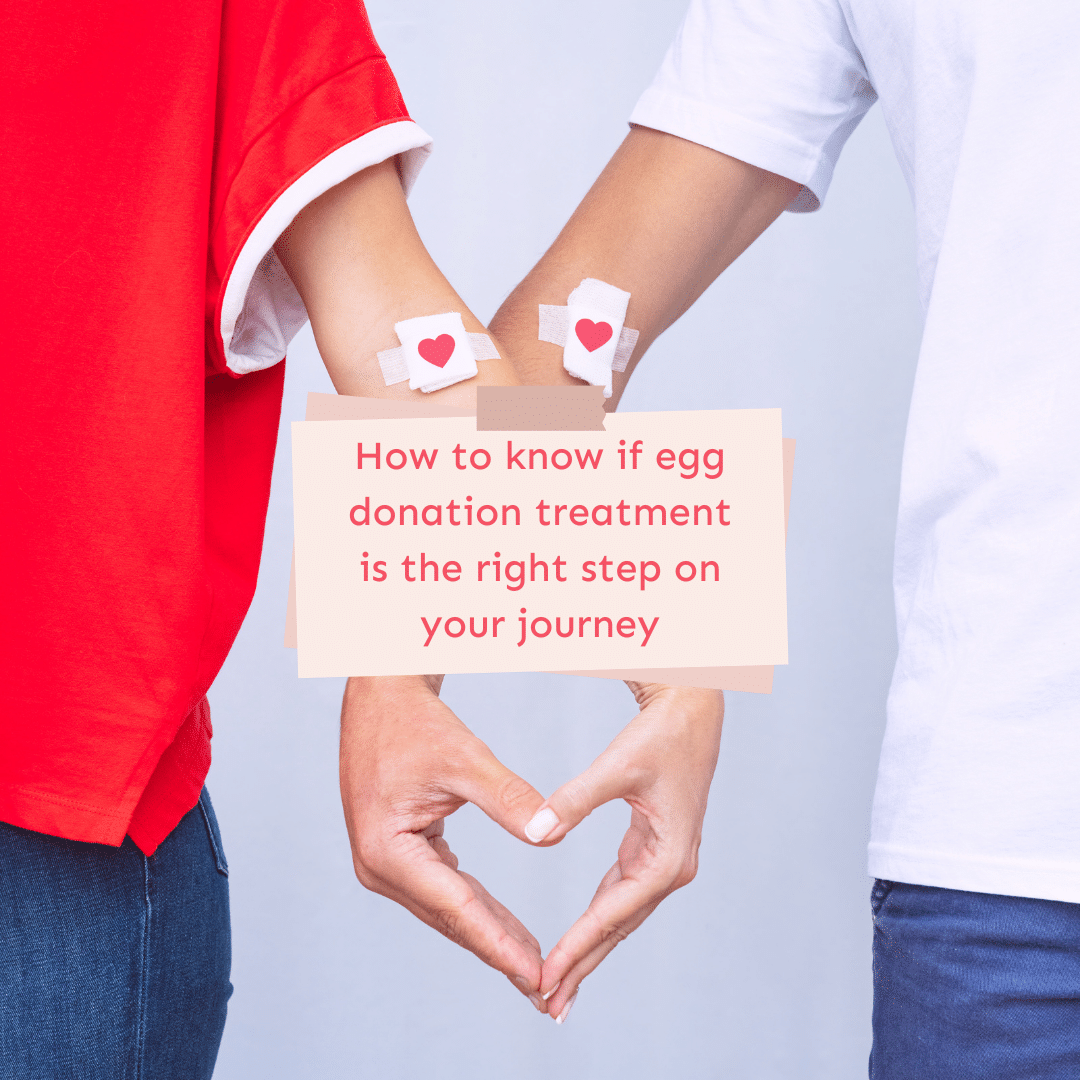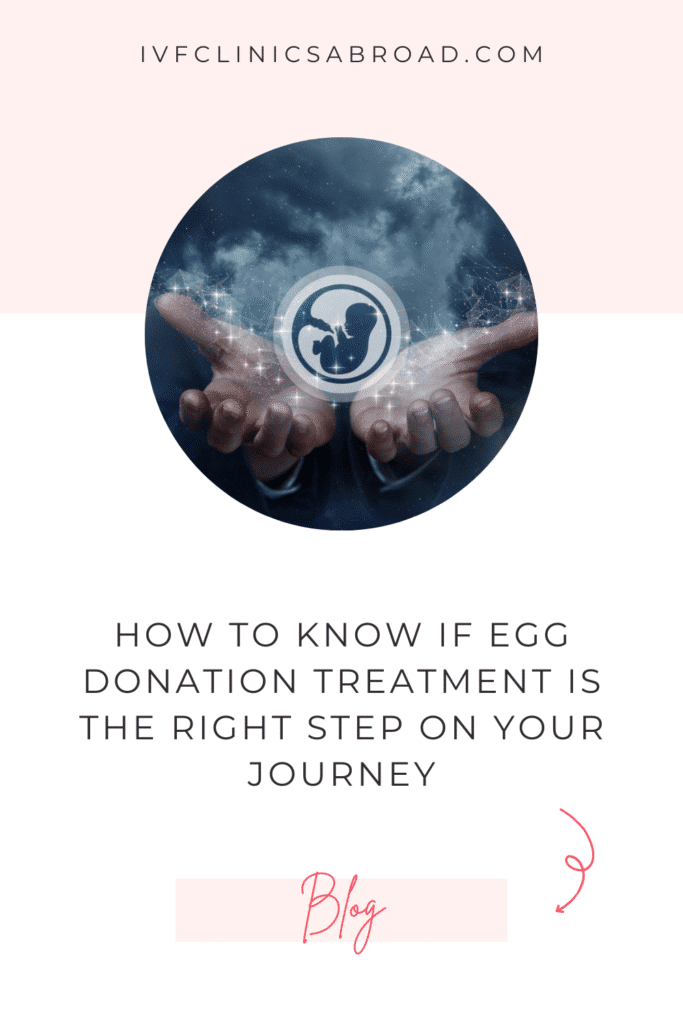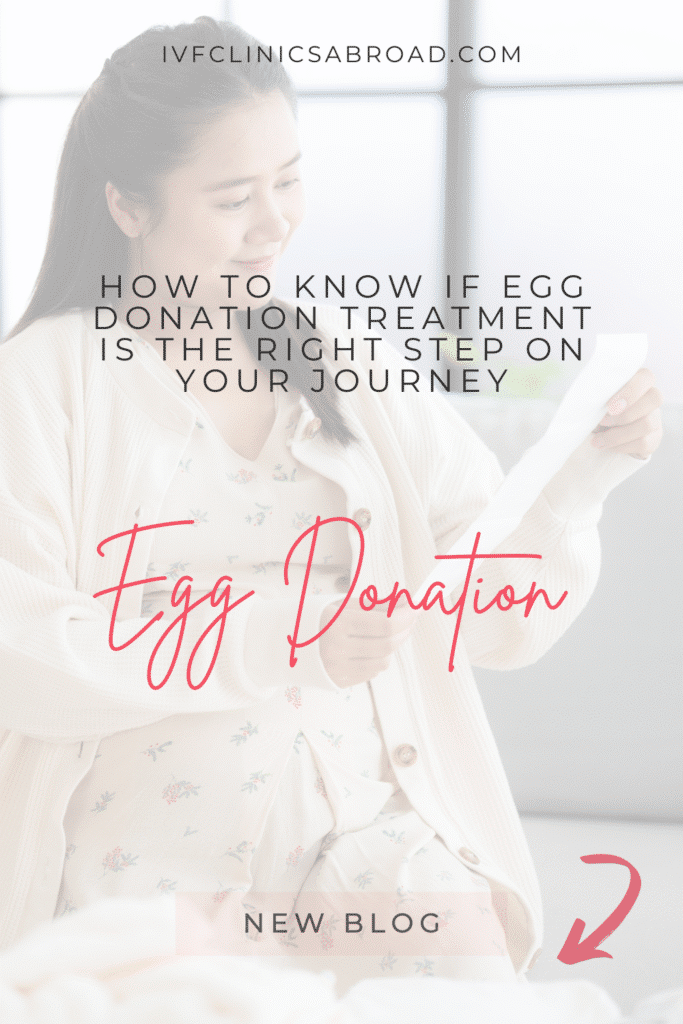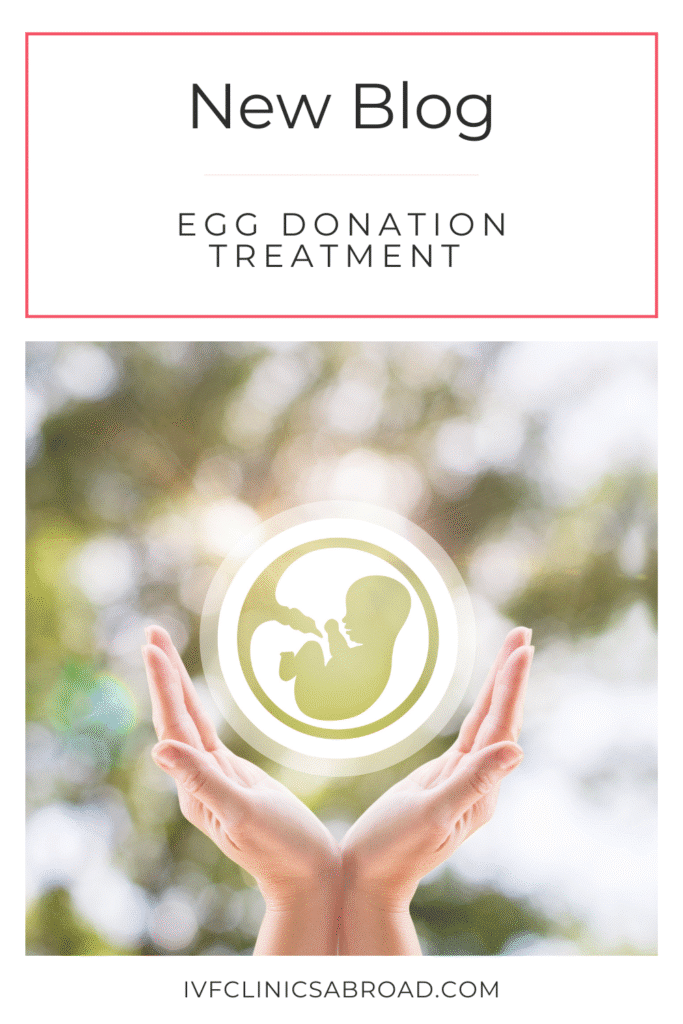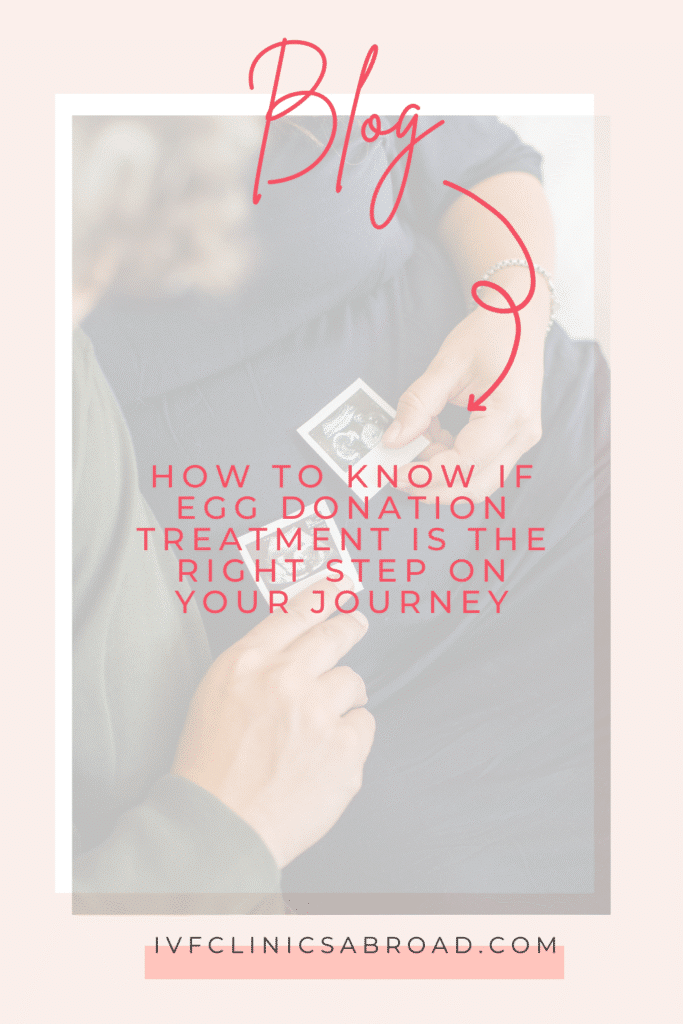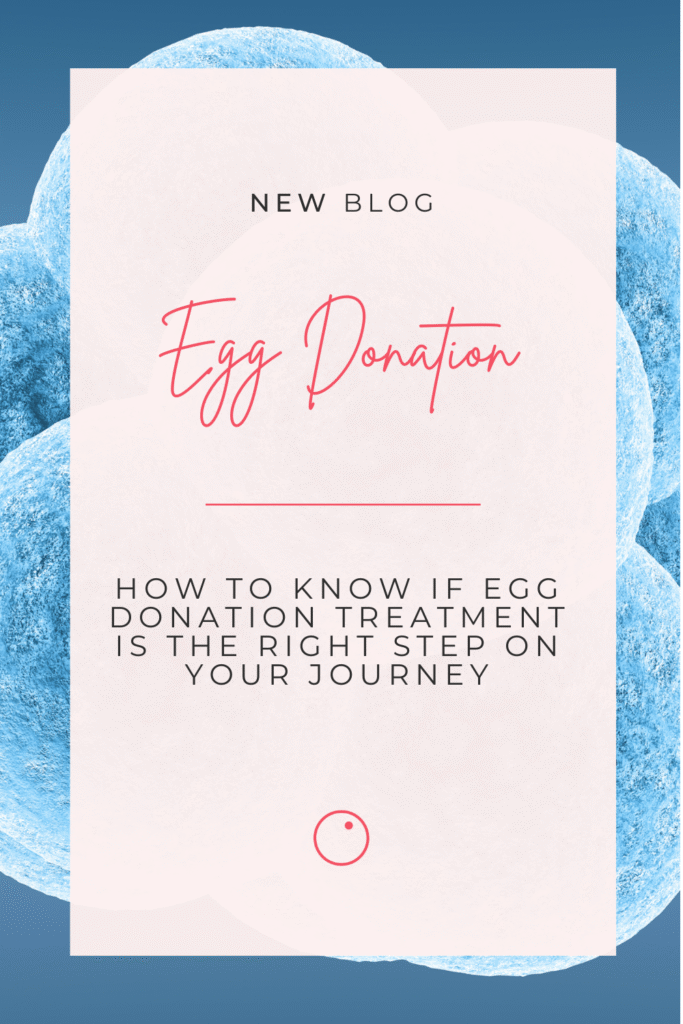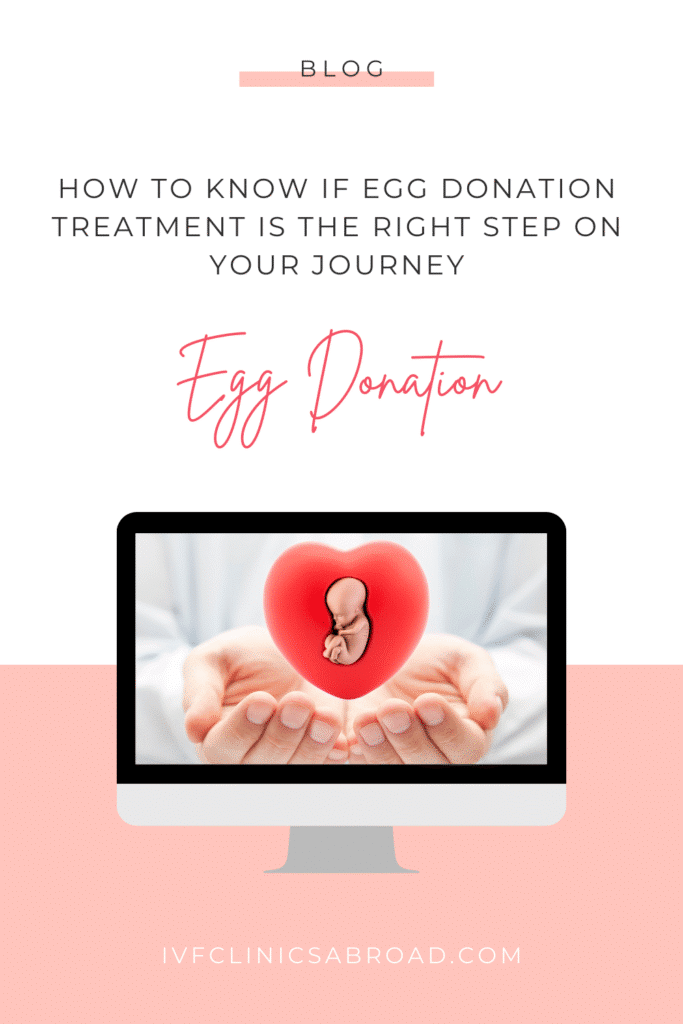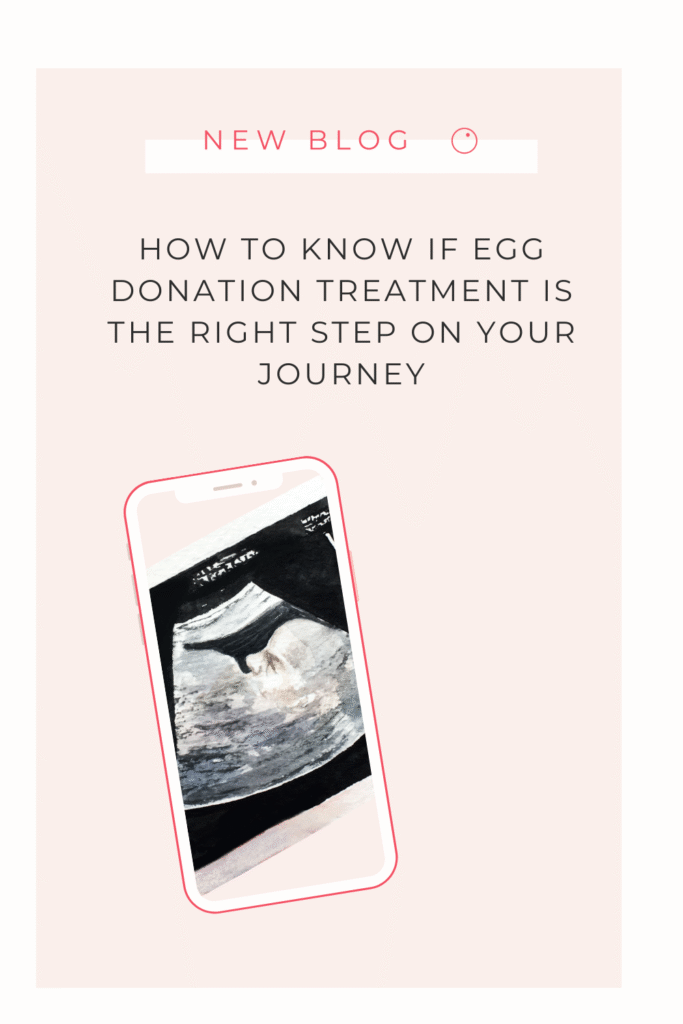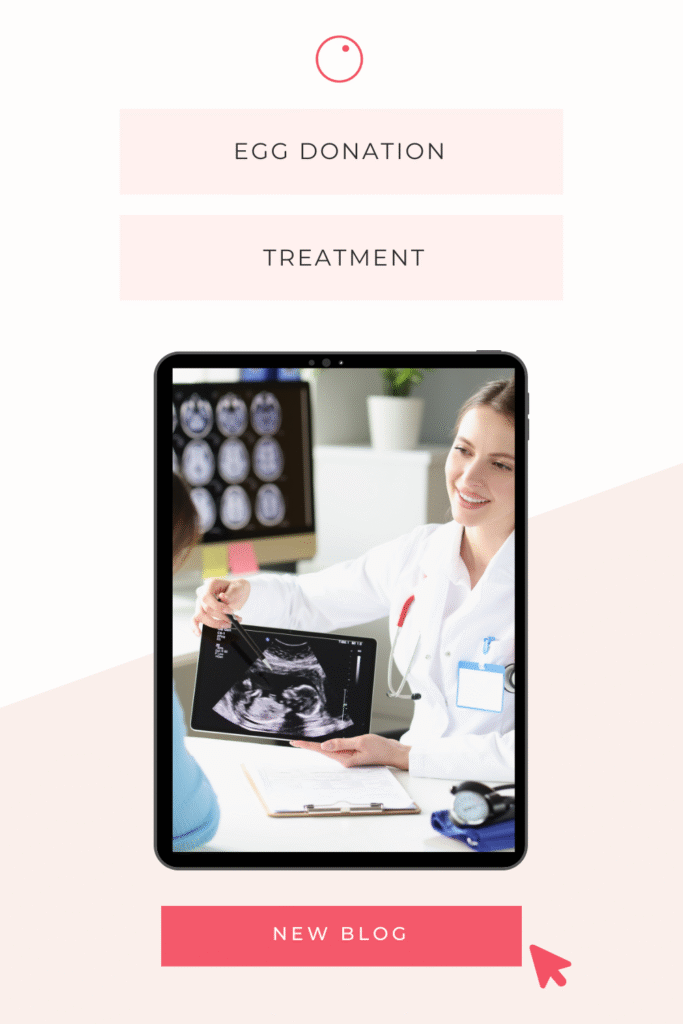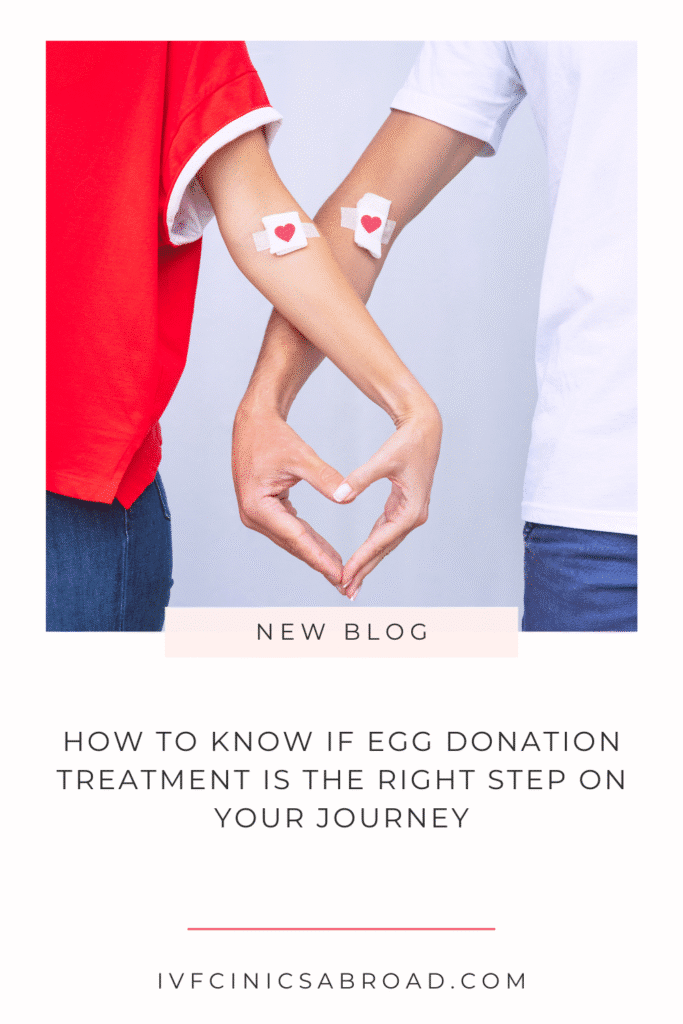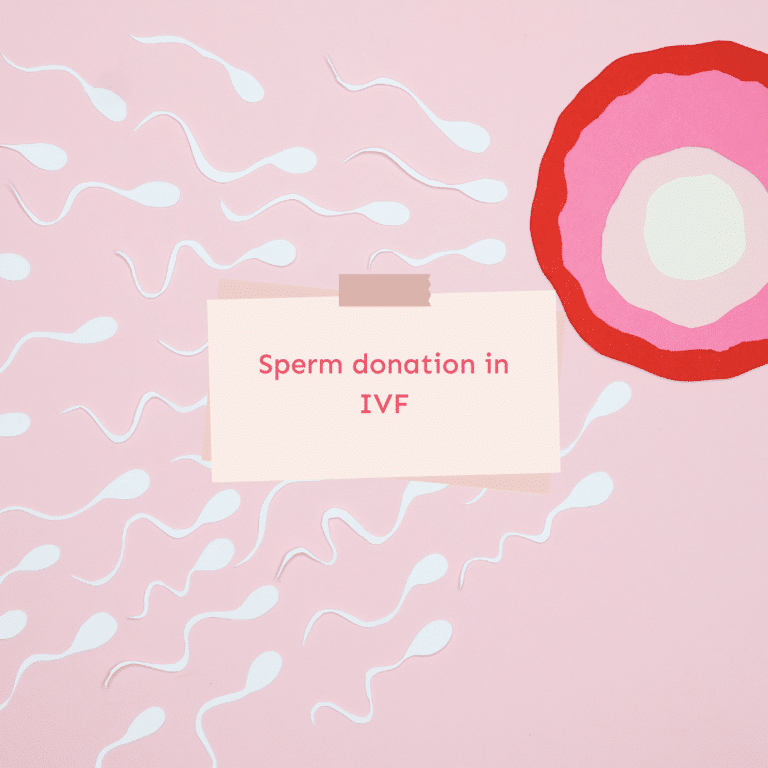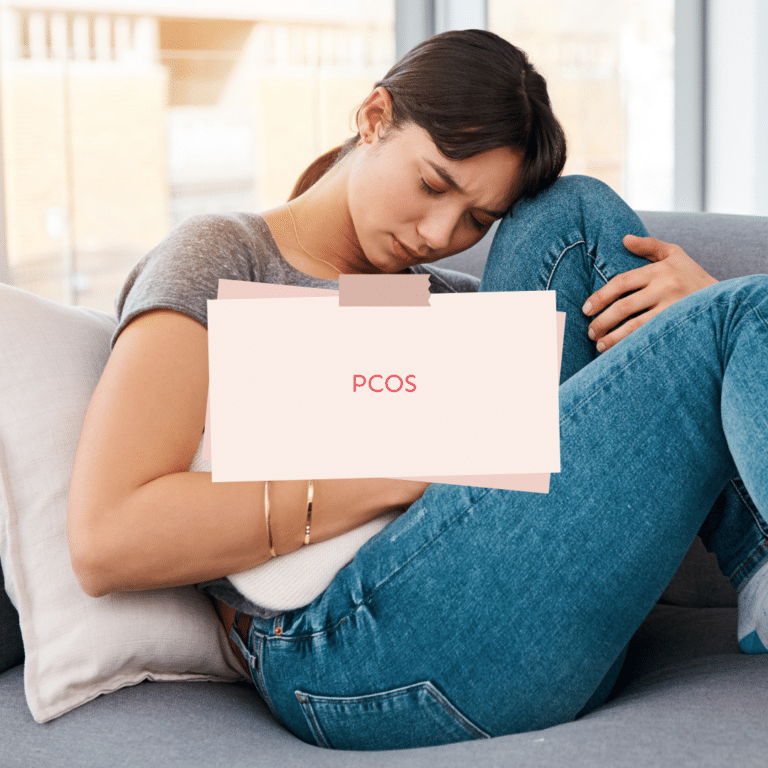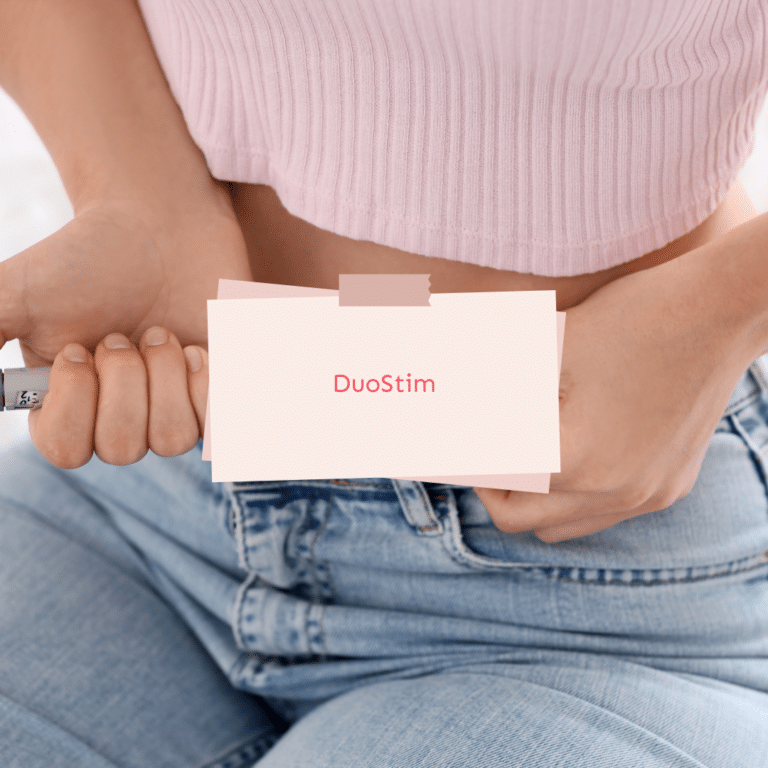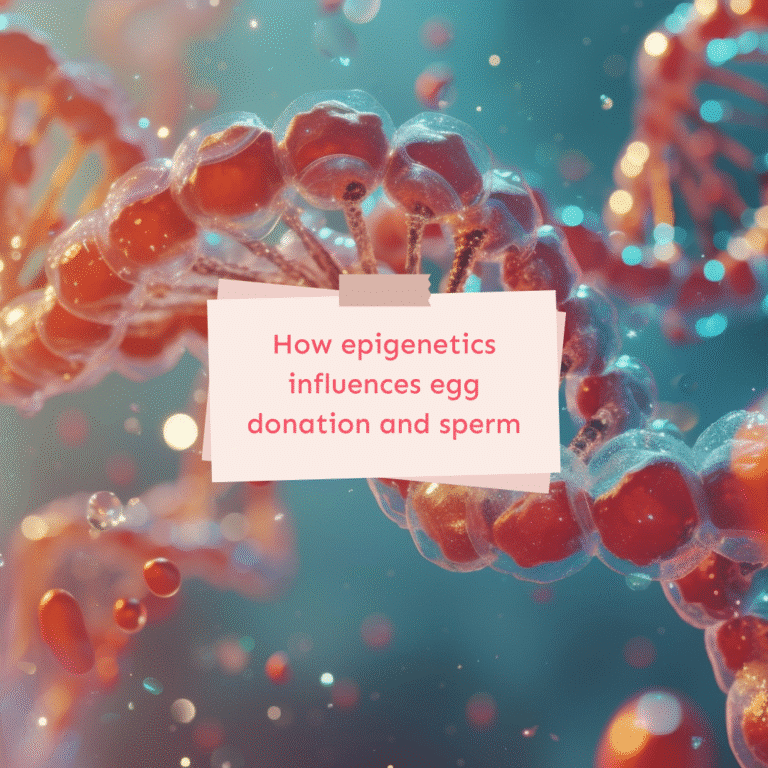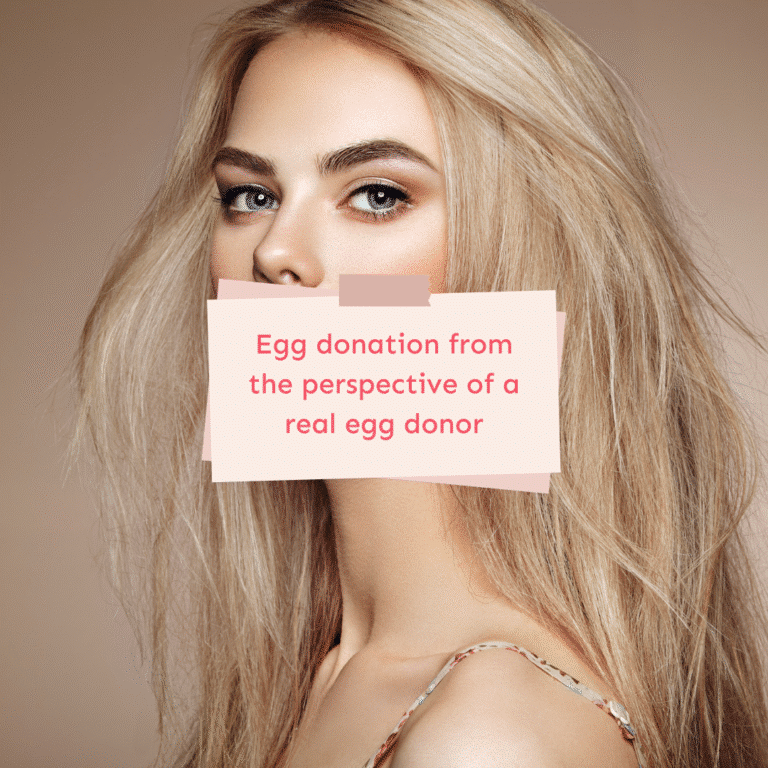How to know if egg donation treatment is the right step on your journey
Choosing to become a parent isn’t always straightforward – and sometimes, egg donation becomes part of that story. Maybe you’ve already been through several IVF attempts, or you’ve just found out that your ovarian reserve is low. Or perhaps you’ve always known that using donor eggs could one day be part of your journey. No matter where you are right now – just starting to explore, or already deep in the egg donation process – we’re here to walk beside you.
This article is for individuals or couples who are thinking about egg donation as a treatment option, but still have questions. We’ll explore when and why egg donation may be recommended, what it really involves, and how you can feel confident that it’s the right decision for you. You’ll also learn more about what it means to use donor eggs from both a medical and emotional perspective – and how to take the next step when you’re ready.
When is egg donation the right option for you
There’s no single moment when the decision suddenly becomes clear. For most, the idea of egg donation comes after a long and often difficult fertility journey. Maybe you’ve been struggling with infertility for years and are now looking for a viable option that still allows you to carry a child. Or you’re facing premature ovarian failure, genetic conditions, or simply the reality of age and declining egg quality.
Egg donation can offer hope when other fertility treatment paths have not worked, or when using your own eggs is no longer recommended. It’s not just a medical step – it’s also an emotional one, and it can take time to get there. And that’s okay. Understanding why egg donation is suggested, and what it means for you as a recipient, is the first part of making a decision that aligns with your personal values.
Understanding the emotional and medical reasons behind egg donation
Many women feel a deep sense of loss when they’re told they may need to use donor eggs. It can feel overwhelming – like your body has let you down or your plans have shifted too far from what you expected. These emotions are completely valid. At the same time, this option can be a turning point – the moment when hope returns and a new path becomes visible.
From a medical point of view, doctors may suggest donor eggs for various reasons: diminished ovarian reserve, failed IVF cycles, or age-related challenges that affect the quality of the eggs. Conditions like premature ovarian failure or repeated miscarriages might also lead to this recommendation. The decision is never taken lightly – and it always includes your full medical history and fertility tests.
Why egg donation may be the next step on your fertility journey
You’re not alone in considering egg donation. Every year, thousands of women choose this path – not because they’ve given up, but because they’ve chosen to move forward. Using donor eggs is about redefining what it means to build a family, and trusting in a process that still gives you the chance to experience pregnancy, birth, and motherhood.
Egg donation may be the right option when the quality or quantity of your own eggs makes IVF treatment unlikely to succeed. In such cases, switching to donor eggs often increases the success rate significantly. While the process may feel unfamiliar at first, many women find that once the decision is made, a sense of peace follows – because now there’s a real chance to move forward.
Key factors to consider before choosing egg donation
Making the decision to use donor eggs is not just about following a medical recommendation – it’s about choosing a path that aligns with your hopes, your circumstances and what feels right in your heart. While egg donation may be presented as a logical next step, it’s important to understand the reasons behind it and reflect on whether it truly fits your situation. This is a deeply personal choice, and there’s no one-size-fits-all answer.
There are a number of key factors to consider before moving forward. These include your age, ovarian reserve, previous IVF experiences, and how you feel emotionally about using another woman’s eggs. Your fertility doctor will look at both your medical history and your reproductive health to help you understand if this is the most suitable treatment option – but it’s also about what you feel comfortable with.
What makes someone a good candidate for donor eggs
Every fertility journey is different, but there are certain medical reasons why donor eggs might be recommended. Women who have a low ovarian reserve, poor egg quality or who are experiencing premature ovarian failure may benefit from this option. Others may have had multiple failed IVF cycles using their own eggs, with no clear explanation, or carry genetic conditions that they do not want to pass on.
In all of these cases, using donor eggs can offer a renewed chance of highest success. Your clinic will assess your overall health, hormone levels, previous treatments and response to stimulation, but also consider emotional readiness. Candidates for egg donation don’t have to meet a perfect standard – they just need to be ready to receive, physically and emotionally, and feel supported through the process.
How to know if this treatment option fits your situation
Sometimes, the hardest part is not what the doctors say – but what your inner voice tells you. If you’re feeling unsure whether this path fits your life, it may help to take a step back and reflect. Do you feel emotionally prepared to carry a child conceived with a donor’s eggs? Can you imagine yourself telling this story in the future, in a way that feels honest and strong? Does the idea bring you peace – or does it still raise more questions?
Choosing egg donation doesn’t mean letting go of your dream – it’s a new way to hold on to it. When the success rate with your own eggs is low, and you’re still determined to experience pregnancy and birth, this option can make all the difference. If your heart is leaning toward trying everything possible, and this feels like a door that’s still open – it may well be the step that leads you forward.
Ethical and legal aspects of egg donation in different countries
Egg donation touches on far more than just biology – it raises personal, cultural and legal questions that deserve time and space. Depending on where you live, the rules about egg donation can vary significantly. While some countries openly support this treatment, others have restrictions that can make the process more complicated or even impossible. This can feel frustrating, especially when your path to parenthood depends on where you happen to live.
Understanding the legal and ethical differences is essential when you’re considering egg donation. It affects what kind of donors are available, whether the child can access information about the donor later in life, and how open or anonymous the process is. It also determines whether the clinic is allowed to inform you about the donor’s background – something that matters deeply to many intended parents.
Why egg donation is still restricted in some countries
In some places, especially in parts of Europe, egg donation is still viewed as ethically complex. Countries like Germany and Switzerland have strict regulations – not necessarily because the procedure is unsafe, but due to concerns about family structures, anonymity and reproductive rights. The idea of a woman donating her eggs to another is not always accepted at a legal level, even if many individuals would choose it.
As a result, couples struggling with infertility often have to travel abroad to access egg donation services. This creates inequality – where those who can afford to travel have options, and others are left without. For many women, this adds pressure and emotional weight to an already difficult decision. That’s why finding clear information and support is so important – so you can move forward in a way that feels safe, informed and aligned with your values and beliefs.
The difference between open, known and anonymous donation
One of the most important decisions in the donation process is how much you’ll know about the egg donor – and what your child will be allowed to know in the future. In some countries, only anonymous donation is legal. In others, children have the right to know the donor’s identity once they reach a certain age. And some programs even allow you to choose a known donor – someone you already have a connection with, like a friend or relative.
Each option has its own implications. An open donation may bring more transparency, but also more questions over time. Anonymous programs protect privacy, but may limit your child’s access to important genetic information. What’s important is that the decision aligns with your personal values. A good clinic – or donor agency – will help you explore what feels right for you, and explain what’s legally possible in the country where the donation takes place.
The egg donation process explained step by step
If you’ve never been through egg donation before, it can feel overwhelming at first – with medical terms, timelines and steps you’ve never imagined having to learn. But the truth is: once you understand how the donation process works, much of the fear fades. It becomes manageable – one step at a time, with clear milestones and support along the way.
At its core, the process is built around one woman donating her eggs to help another become a parent. The donor goes through screening, stimulation and retrieval. The recipient – that’s you – prepares her body for embryo transfer. What happens between these two women is deeply personal, and yet medically guided with great care. Every part of this process is designed to ensure the safety and well-being of both donor and recipient.
What the donation process looks like for the recipient
Your part of the journey starts with preparation. A team of fertility specialists will guide you through hormonal support to build up your endometrium – the lining of your uterus – so that it’s ready to receive an embryo. This usually involves taking medication over several weeks, depending on your natural cycle and the clinic’s protocol. While you prepare, the donor undergoes her own stimulation cycle, which ends when the eggs are retrieved in a short outpatient procedure.
Once the eggs are retrieved, they are fertilised in the lab – either with your partner’s sperm or a donor’s – and the resulting embryos are monitored for quality. Most fertility clinics recommend transferring just one embryo per cycle to reduce risks. The transfer is a simple and painless procedure, followed by a two-week wait before the pregnancy test. This moment is full of quiet hope – because after everything, this could be the start of your next chapter.
Understanding the egg donor program and selection process
Egg donation programs in Europe are usually very selective – only the most suitable candidates are accepted. The medical and psychological screening is far more extensive than for sperm donors. Each donor must pass a series of health checks, family history reviews, and sometimes genetic testing. These steps are in place to ensure the quality of the eggs and the safety of everyone involved.
The amount of information about the donor depends on the country and the clinic. In some cases, you’ll only learn the basics – like height, hair and eye colour, blood type and occupation. In other places, full donor profiles are available – but they usually come at a much higher price. Most clinics use a team of experts to match a donor to you based on physical similarity and medical compatibility. In some clinics, you can express your preferences in advance, though you won’t always have direct access to profiles.
Some clinics now also use AI tools like Fenomatch, which allow a more detailed comparison of facial features, genetic markers and biometric traits between donor and recipient. These technologies can help standardise and support the selection process – especially when there are many donors to choose from and when physical resemblance is important to the intended mother.
Choosing a donor is a long and emotional process. Even when information is limited, it often feels very personal. Many women go through several rounds of discussion and reflection before making a decision. It’s okay to take your time – the clinic’s team, and sometimes your coordinator, will support you through each step until the right match is found.
“Egg donation is not a compromise – it’s a real chance to finally become a mother and bring your dream to life.”
Nathalie Wiederkehr
How egg donors are selected – and why diversity matters
One of the most important steps in your egg donation journey is choosing the right donor – but what does “right” even mean? For some, it’s about physical resemblance. For others, it’s about shared values, education, or simply a gut feeling. And for many, it’s a mix of everything. What matters is that you feel comfortable with the process – and supported in making a choice that reflects what’s important to you.
The selection of egg donors is a highly structured process, but also one that varies depending on the clinic and the country. Some clinics make the match for you, others let you choose between profiles. And increasingly, diversity is becoming a key factor – not only because every woman is different, but also because cultural, genetic and ethnic compatibility can play a meaningful role in how this experience feels, now and in the future.
What clinics look for in an egg donor
Every clinic follows its own donor program guidelines, but most share similar criteria. Egg donors undergo detailed screening for physical and mental health, family medical history and genetic conditions. Many countries also set legal requirements regarding age and previous donations. Donors are generally between the ages of 21 and 32, and must meet strict standards – not just in terms of physical health, but also emotional stability and motivation.
Some clinics work with external donor agencies, others with in-house programs. In both cases, the screening process is thorough. A donor cannot participate unless she has passed every step. Beyond the medical checks, clinics may look at lifestyle, education or even personality traits – depending on what’s allowed in the local legal framework. This process is designed to protect both the donor and the recipient, and to offer the best possible outcome.
Why ethnic background and country matter in donor selection
The country where you seek treatment often determines what kind of donors are available – and how much choice you have. In Spain and Northern Cyprus, for example, there’s a large and diverse donor pool, which means better chances of finding someone who resembles you physically or shares your ethnic background. This is especially important for women from mixed heritage or less represented groups, who may not find a match in their home country.
It’s important to know that egg donation in both Spain and Northern Cyprus is strictly anonymous by law. That means you won’t be able to meet or contact the donor later, and your child will not have the right to access her identity in the future. For some, this provides a sense of privacy and emotional clarity – for others, it may raise questions. What matters is that you choose a country and system that aligns with your personal values.
Another key point that many overlook: just because treatment takes place in Spain or Northern Cyprus doesn’t mean the donor will be Spanish or Cypriot. These countries attract women from many different backgrounds – including Eastern Europe, North Africa, the Middle East and Latin America. The availability of donors is wide-ranging, and physical resemblance is often easier to match than expected. The only group that can be more difficult to find are Asian donors, which are limited in many parts of Europe.
That’s why it’s worth taking time to explore different countries and clinics before deciding where to begin. Understanding the realities – beyond the brochure photos and basic statistics – helps you make an informed decision that feels grounded and informed.
Where to find the right donor egg program
Finding the right donor egg program isn’t just about choosing a clinic with good statistics – it’s about finding a place that listens to you, respects your wishes, and supports you through every step. While the medical side of things is of course essential, many women realise that what matters just as much is how they’re treated – as a person, not just a patient.
Each country has its own approach to egg donation. Some clinics offer more freedom in the selection process, others follow strict matching protocols. Some work only with anonymous donors, others allow known donation or open identity. The way the program is organised – from screening and donor profiles to emotional support – will shape your entire experience. That’s why it’s worth comparing not just costs or high success rates, but also the overall feel and philosophy of the clinic.
Why countries like Spain and Northern Cyprus offer more choice
Spain and Northern Cyprus have become two of the most popular destinations in Europe for egg donation – and that’s not by chance. Both countries allow anonymous donation, have a high number of available donors, and are home to clinics with years of experience in reproductive care. Because donation is legally protected and culturally accepted, the system works efficiently and the waiting times are usually short.
What makes these countries especially attractive is the diversity of their donor pools. Both Spain and Northern Cyprus have a large number of universities with international students – young women from all over the world who meet the age and health criteria for donation. This is one of the main reasons why clinics in these regions can offer such a wide variety of donors, and why the success rates with donor eggs are often particularly high. Most donors are in their twenties – which means both the quality and quantity of the eggs tend to be excellent.
The matching process is taken seriously, and even when you don’t get access to a profile, a trained team will work carefully to find someone who resembles you as closely as possible. For many intended mothers, this careful and respectful approach makes all the difference.
What to expect from professional egg donation services abroad
Going abroad for treatment can feel daunting, but many international clinics are well equipped to guide you through the process – even if you never set foot in their country until the transfer. From coordinating lab tests at home to arranging travel and accommodation, most offer dedicated services for international patients. Some even provide donor coordinators who act as your personal contact throughout.
Still, it’s important to know what’s included – and what’s not. Some clinics include all medical and lab services in one package. Others charge separately for embryo freezing, extended cultures or additional consultations. Communication is key here: don’t hesitate to ask questions, ask for documents in advance, and check whether the clinic has experience with patients from your country. Feeling well-informed is one of the best ways to stay calm and confident throughout the process.
Success rate and expectations with donor eggs
When you’re considering egg donation, one of the first questions that comes to mind is: will it work? After everything you’ve been through, it’s completely normal to want clear answers. And while no clinic can guarantee success, donor eggs do bring statistically higher chances – especially when compared to IVF using your own eggs after a certain age.
Understanding what those numbers really mean can help you approach the process with realistic expectations. It’s not just about looking at the clinic’s website or comparing rates between countries. It’s about knowing what affects success – from the quality of the eggs to the lab standards, the embryo development, your own uterine environment and the experience of the medical team.
What the numbers really say about your chances
In many clinics, especially in countries with high medical standards and large donor programs, the success rate for donor egg cycles is often around 80 % – based on positive pregnancy tests after embryo transfer. What many people don’t realise: these numbers usually don’t include the natural miscarriage rate, which still exists even when the donor is young. Statistically, about 10 to 15 % of pregnancies can end in early miscarriage – similar to the rate seen in healthy women in their twenties.
Still, the overall outcome is very encouraging. With high-quality embryos and careful preparation, many women achieve a successful pregnancy already after one cycle – and sometimes have embryos left for a future sibling. If PGT-A is used to select chromosomally normal embryos, the success rate can be as high as 95 % across three transfers. It’s a strong reminder that using donor eggs is not a last resort – it’s a highly effective option with real potential.
How age, clinic and embryo quality impact the IVF treatment outcome
Even though the eggs come from a young donor, your own body still plays a role in the final outcome. Uterine health, hormone response and medical conditions such as endometriosis or thyroid imbalance can all influence implantation. That’s why most clinics will run a full check of your reproductive health before beginning treatment.
The embryo quality depends on both the egg and the sperm – and how the fertilisation and development process is handled in the lab. A strong lab with experienced embryologists can make a huge difference here. Whether you use fresh or frozen donor eggs, the success rates are now very similar in most clinics, thanks to improved freezing techniques and lab standards. In the end, success is a combination of many factors – and the right team will explain these to you in a clear and honest way.
Using donor eggs as an intended mother
For many women, choosing to use donor eggs brings up deep and often conflicting emotions. It’s not just a medical decision – it’s something that touches identity, motherhood and the way we imagine our connection to our future child. And that’s exactly why this part of the journey deserves time, honesty and space to grow.
Becoming an intended mother through egg donation doesn’t make your experience any less real. You’ll still carry the pregnancy, feel every change in your body, and go through all the ups and downs that come with waiting, hoping, preparing. Your child will grow in your womb, nourished by your body. The bond you build won’t depend on genetics – it will grow through every heartbeat you share.
What it means to carry a child with donor eggs
At first, the thought can feel unfamiliar. You may ask yourself: will I feel the same love? Will the baby feel like mine? These questions are natural – and more common than you might think. But most women who have gone through the process describe something beautiful and grounding: that the moment they saw the heartbeat, felt the first kick, or held their baby for the first time, everything else faded away.
Using donor eggs means accepting that genetics is just one piece of the story. What matters more is the life you create together, the experiences you share and the love you give. And there’s something else that’s often overlooked: the science of epigenetics shows that the environment in your womb can actually influence how certain genes are expressed in your baby. This means your body doesn’t just carry the child – it actively shapes part of who they become.
This child grows inside you, depends on you – and will call you mum from the very beginning. The way families are built is changing, and what makes a mother has never been just DNA.
How to cope emotionally and feel connected during the process
It’s completely okay to feel uncertain, or even to grieve the idea of not passing on your own genes. These feelings don’t mean you’re not ready – they mean you’re honest. Giving yourself time to process, talking to others who’ve walked this path, or working with a counsellor who understands fertility issues can be incredibly helpful. Sometimes, just saying things out loud is enough to feel lighter.
Staying involved in each step of the process also helps build a sense of connection. Choosing a donor (even anonymously), seeing embryo photos, following the development – all these things matter. And once the pregnancy begins, your body takes over in the most powerful way. You’ll be amazed at how natural it begins to feel – not overnight, but with each step, more and more your own.
Your fertility journey – from uncertainty to decision
No matter how long you’ve been trying to get pregnant – whether it’s been months, years or a lifetime of wondering – reaching the point where egg donation is on the table is never simple. It often comes after a period of heartbreak, hope and hesitation. Maybe you’ve already heard the term egg donation from your doctor, or maybe you’ve only just begun researching it yourself. Either way, you’re not alone in feeling unsure about what to do next.
There is no perfect moment when everything suddenly makes sense. Most intended mothers describe the decision as something that developed gradually – a shift from resistance to acceptance, from sadness to strength. What helped most? Time, honest conversations, good information and someone to talk to who didn’t judge. You don’t have to be completely certain to move forward – you just have to feel that this path is worth exploring.
How to prepare mentally and physically
Preparing for egg donation isn’t just about medication and appointments – it’s about getting your mind and body ready for something new. Mentally, this might mean making peace with the fact that your child won’t share your DNA, or talking openly with your partner about what this means for both of you. It might also mean setting boundaries with people who don’t understand – and choosing carefully who you share your journey with.
Physically, your clinic will guide you through hormone preparation and medical checks to ensure your body is ready for implantation. Some women also take time to focus on nutrition, gentle movement or stress reduction – not because it’s required, but because it helps them feel strong and present. Every step you take, no matter how small, brings you closer to something real.
The role of support, time and trust in the decision-making process
You don’t have to rush. Taking time to sit with your questions – and to feel whatever emotions come up – is part of the process. Sometimes it helps to talk with someone who’s been there, or to speak with a counsellor who knows what this journey feels like from the inside. It’s okay to go slow, to go back and forth, or to not be ready right away.
What matters is that you feel supported. Whether that’s by a trusted doctor, a partner, a close friend or a dedicated clinic coordinator – having someone who sees you and respects your pace makes all the difference. Trust takes time, but it also starts with small things: being listened to, answer your questions, and not feeling pushed. When those pieces are in place, the next step becomes much easier.
Taking the next step with confidence
Once the idea of egg donation feels less overwhelming, the next question is often: Where do I begin? Maybe you’re not quite ready to make a final decision – but you do want to understand what this path might look like in practice. That’s a good place to start. Gathering information, asking questions and seeing how a clinic responds can already bring more clarity than hours of silent research ever could.
This step isn’t about committing – it’s about exploring with an open mind. Whether you’re looking for a second opinion or simply want to understand the donation process better, booking a first consultation can be a powerful turning point. Not because someone else gives you the answers, but because you begin to feel more grounded in your own.
What happens during your first consultation
The first appointment is usually a mix of conversation, medical review and gentle orientation. A fertility specialist will look at your medical history, any past IVF cycles or test results, and discuss whether egg donation is a suitable option in your case. If you’re early in the process, they might explain the timeline, donor availability and the steps involved in preparing donor egg for treatment.
You’ll also have space to ask questions – about legal issues, costs, donor matching and success rates. If the clinic offers international treatment, you can ask how travel is handled and whether parts of the process can be done from home. A good consultation doesn’t feel rushed – it feels like someone is there to support you every step, even if you’re not ready to proceed immediately.
Questions to ask and what to expect from the clinic
Not every clinic works the same way – and not every clinic will feel right for you. That’s why asking the right questions matters. You can ask about the donor screening process, how the selection is made, whether there’s a donor database or if the clinic handles matching for you. It’s also helpful to ask whether genetic testing like PGT-A is available, and how they handle embryo freezing and storage.
You might want to discuss egg donation services in more detail: how many eggs are guaranteed per cycle, what the costs include, and whether the clinic has experience with patients from your country. And if it matters to you: ask what kind of information about the donor’s background you’ll receive. Feeling safe to ask – and heard when you do – is often the clearest sign that you’re in the right place.
Final thoughts and guidance
If you’re still reading, then you’re already further along than you think. You’ve taken time to learn, to reflect and to face questions that many others avoid. And that alone shows strength – even if you don’t feel it yet.
Egg donation is not a decision anyone takes lightly. It touches on identity, family, biology and hope. But it also offers something powerful: the chance to move forward when other doors have closed. The decision to use donor eggs doesn’t make your path less valid – it simply makes it yours.
You don’t need more information. You need someone who truly understands your needs – and helps you see the next steps clearly, saving you frustration, time and money. And you deserve support that’s honest, human and free of judgement.
If you’re ready to explore this further, our guide on egg donation and IVF options in Europe might help. It includes legal facts, average costs and success rates – including a detailed example from a clinic in Northern Cyprus. It’s not a clinic recommendation, but a starting point for your own thinking.
You’ll find it here – whenever you’re ready.

